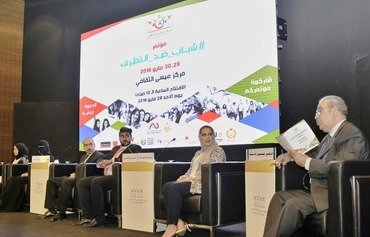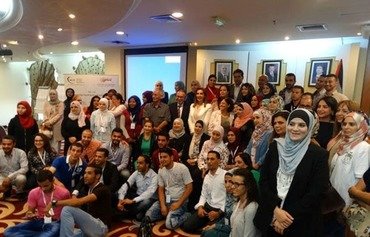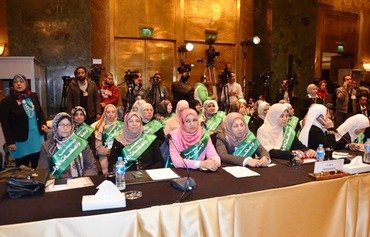Young people from all parts of Egypt attending the 6th National Youth Conference, held at Cairo University on July 28th and 29th, discussed human development and education reform and made a number of recommendations.
President Abdel Fattah al-Sisi, Prime Minister Mustafa Madbouly, Speaker of the House of Representatives Ali Abdel Aal and the Central Bank governor attended the conference, which drew 3,000 youth, representing all provinces.
The government began holding youth conferences in 2016 in order to create a mechanism for integrating youth into the decision-making process.
The conference provides them with a way to express their views regarding the government's performance and development plans and allows their suggestions for the future of the country to be heard.
![Egyptian youth raise the national flag during the 6th National Youth Conference, which sought to integrate youth into the decision-making process. [Photo courtesy of Egyptian Presidency’s media office]](/cnmi_am/images/2018/08/15/13864-Egypt-youth-conference-600_384.jpg)
Egyptian youth raise the national flag during the 6th National Youth Conference, which sought to integrate youth into the decision-making process. [Photo courtesy of Egyptian Presidency’s media office]
Participants at the recent conference declared 2019 the 'year of education' and vowed to restore sports, art and cultural activities to university campuses, as well as called for the launch of a national project to develop the education system.
They also called for a centre for the training and education of teachers, in line with international standards, and the provision of scholarships for this purpose.
Sustained dialogue
"The youth conferences held over the last two years witnessed frank and civil dialogue between the state's executive and legislative institutions and the youth," said Egyptian MP Usama Haikal, who heads the parliamentary committee for media, culture and antiquities.
The conferences have offered young people a way to question the policies implemented by the government in various fields, he told Al-Mashareq.
Engaging in direct dialogue with the youth helps the government grapple with the challenges the country is going through, he said.
Young people have been marginalised for decades, he added, noting that as a result, the government now needs "sustained dialogue with the youth as a means to integrate them into the decision-making process".
Youth conferences are a good way to "discover and prepare young leaders to take up executive and legislative positions in the future", he said.
Education reform
At its first national youth conference, held in Sharm el-Sheikh in October 2016, the government announced a package of measures to support youth and entrepreneurship.
These included a programme to support and develop small and medium-sized enterprises (SMEs) by directing the banking sector to allocate at least 20% of all loans to financing youth-owned SMEs over the next four years.
Recommendations made by successive youth conferences were reflected in the government programme that was approved by parliament in July 2017, said Ibrahim al-Shehabi, youth secretary of the Democratic Generation Party.
This "demonstrates the success of youth conferences as a mechanism to integrate them into the decision-making process", he said.
The recently concluded conference focused on "the relationship of economic reform to the development and raising the quality of education", he said.
The education sector must supply the labour market with qualified workers who can contribute to the country’s economic and industrial development, "which collapsed in the past decades", al-Shehabi said.
The conference also proposed a comprehensive national plan to confront "the culture of extremism and terrorism", he said.
It focused on the creation of an educational system capable of building Egyptian youth who can cope with change in a positive way and express the richness of the human identity and acceptance of others, he added.
Youth involvement
At the recent conference, the Partisan Youth Co-ordinating Committee presented a paper to the government calling for Egyptian identity to be protected from the currents of extremism and terrorism.
"The initiative includes a number of projects and activities that are being prepared and will be announced when ready," said committee spokeswoman Shaima Abdel Elah.
"Preparations are being made in workshops held at the headquarters of all the parties to produce policy papers on most issues affecting the community," she said.
"The co-ordinating committee will work in the upcoming period to help the partisan youth engage further in the decision-making process through various activities," she added.

![President Abdel Fattah al-Sisi addresses the 6th National Youth Conference, held at Cairo University on July 28th and 29th. [Photo courtesy of the Egyptian Presidency’s media office]](/cnmi_am/images/2018/08/15/13863-Egypt-conference-Sisi-600_384.jpg)







‘Claquette’ is a word that we always hear said by cinema people. With this, they mean to re-shoot a scene for failure to show the scene in a way that is satisfactory to viewers or the director. Away from the cinema and its terminology, a few days ago when the new school year started, writers and the people concerned with education started to write and talk about the proposed developments in education, and what should be done to guarantee better education. It’s fine; everyone has the right to talk and write about this because it isn’t a private issue related to certain people. This is because personal issues are of concern to us because those who don’t care about the people are not from them. There have been multiple pictures and ways for education in Egypt, including Japanese schools. This is in addition to other methods, like the introduction of new educational methods, such as e-learning or tablet. We’ve found out that many educators don’t recommend introducing this strange object to our students’ minds. This new experiment may succeed or not; it’s more likely that it will fail. This is because before streamlining this experiment, it should have been first tried on a sample of schools at different settings in Egypt, including rural and urban areas, and even in Nubia and Aswan where schools still use floor mats instead of seats.
Reply1 Comment(s)